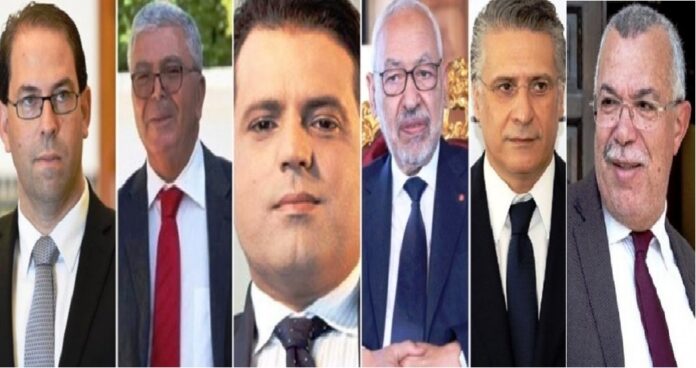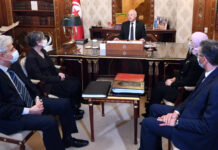It seems that the coming days in Tunisia will be the stage of opening various judicial files that have been suspended or concealed, especially files that relate to accusations against prominent political figures.
The arrest of the former Minister of Justice and Islamist leader Noureddine Al-Bhiri showed that the Tunisian authorities are serious about opening various files, despite the human rights and media campaigns surrounding this case to pressure for his release and block the opening of other files.
Tunisian media reported that the Public Prosecution Office of the Court of First Instance in Tunis decided to refer frozen Parliament Speaker Rached Ghannouchi, former Prime Minister Youssef Chahed, Head of the Heart of Tunisia Party (Qalb Tounes) Nabil Karoui, President of the Free Patriotic Union Salim Riahi and presidential candidate for the 2019 elections Abdel Karim Zbidi to the attention of the criminal chamber to be tried for “several charges, including violating political advertising laws, failing to disclose financial resources for the electoral campaign, and other crimes of the electoral law.”
Although the referral decision indicates the transgressions of a large number of presidential candidates, Ghannouchi’s name stands out among them despite his not being nominated, which raises questions about the nature of the accusations leveled and the party supported by the leader of the Ennahda movement in the presidential elections.
Tunisian media reported that the decision to refer the accused to trial was based on the report of the Court of Accounts regarding the premature presidential elections of 2019.
Ennahda denied the news of referring Ghannouchi to the Public Prosecution and said that it had not received any official notification, according to Ghannouchi’s political advisor, Riad Al-Shuaibi, who said, “We have not received any official correspondence or notification related to this issue.”
So far, there is nothing to suggest that the judicial authorities are taking into account the pressure exerted by the Ennahda movement and its allies from left-wing and human rights figures regarding the Al-Bhiri case, and has overlooked the showy movements of Al-Bhiri’s defense team and his wife, Saeeda Al-Akrimi, who announced on Wednesday that she had staged a sit-in at the hospital where her husband is being treated.
In addition, the judicial authorities do not give any consideration to those who accuse them of implementing instructions from the Presidency of the Republic or the Minister of the Interior, at a time when observers say that the stability of the judicial institution in the face of pressure shows that the judiciary has begun to recover from the political interference witnessed in the past ten years, and Al-Bhiri was one of the accused of leading these pressures because he served as Minister of Justice during the Troika rule between 2012 and 2013.
The Court of Accounts, which is the highest judicial supervisory body in Tunisia, revealed in a report that the Ennahda movement had contracted with an American advertising and pressure company in order to polish the movement’s image.
The report also accused the Qalb Tounes (Heart of Tunisia) party, headed by businessman Nabil Karoui, of contracting with a foreign pressure company worth 2.85 million dinars, and part of the value of the contract was transferred through an unauthorized bank account, which is his wife’s account.
Under the pressure of the Tunisian street and the recommendations of the President of the Republic, several files were opened, such as the file of Noureddine Al-Behairi and Fathi Al-Baldi, and finally the implementation of the report of the Audit Department by summoning several influential figures, and this is an important step in establishing equality between everyone and the rule of law and institutions.
Ghannouchi’s personal Facebook page stated that “the Ennahda movement holds the head of the de-facto authority, Kais Saied, and the person in charge of the affairs of the Ministry of Interior, Tawfiq Sharaf El-Din fully responsible for the physical safety of Mr. Al-Bhiri,” in a speech that seemed to go beyond the traditions of dealing with the presidency.
Interior Minister Tawfiq Sharaf El-Din announced on Monday that there are “serious suspicions of terrorism” in the file of Al-Bhiri’s arrest which are “about illegally submitting nationality certificates, identity cards and passports to people I will not describe and I will let the judicial investigation describe them correctly.” He added that among the people was a girl from Syrian parents.
On Tuesday, the Court of First Instance revealed in a statement that the Public Prosecution Office at the Anti-Terrorism Judicial Pole had opened a search and investigation into this file.











